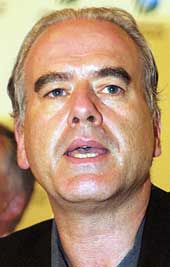 |
| Tim Lamb |
London: The threat of suspension from international cricket was a last-minute change to the sport’s regulations put in to force England to tour Zimbabwe, England and Wales Cricket Board (ECB) chief executive Tim Lamb was quoted as saying.
The ICC said last month it would suspend any country refusing to fulfil its tour obligations for anything other than security reasons and would also levy a $2 million fine.
Lamb was quoted as saying the decision to introduce the sanctions as changes to ICC regulations was taken at the last minute before an ICC board meeting in New Zealand in March.
“I think certain members of the ICC, who... were concerned about England not completing the tour (to Zimbabwe), discussed what could be done and saw a change in regulations as rather an elegant way of putting pressure on England,” Lamb was quoted as saying in Thursday’s Guardian newspaper.
Lamb said a meeting of ICC chief executives in Dhaka, in February had approved tabling a motion at the meeting in Auckland that would ensure countries fulfilled their tour obligations.
The motion did not mention changing the regulations to include the penalties of suspension and fines, and this was raised only one day before the board meeting, he said. “It was not until 11th-hour discussion on the eve of the meeting itself that it was proposed as a change to the regulations,” said Lamb.
The ECB has been embroiled in a political battle over whether to tour Zimbabwe, after the British government said it has concerns about the human rights record of President Robert Mugabe.
Des Wilson, chairman of the ECB’s corporate affairs and marketing advisory committee, resigned on Tuesday over the Zimbabwe tour and the ICC’s new penalties. In his resignation letter Wilson accused the ICC of imposing ”draconian and disproportionate” penalties on countries which refused to tour other nations for moral reasons.
He said the ECB should tour only under protest while seeking ”to change the protocol so that no other country can be coerced in this way”. Also on Thursday, The Daily Telegraph said Australia had been the principal driving force in ensuring the sanctions became part of the ICC regulations. (Reuters)










